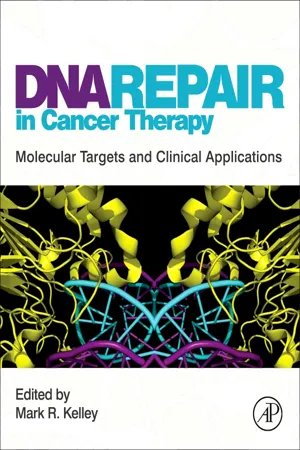
- 330 pages
- English
- ePUB (mobile friendly)
- Available on iOS & Android
About This Book
Cancer therapeutics include an ever-increasing array of tools at the disposal of clinicians in their treatment of this disease. However, cancer is a tough opponent in this battle, and current treatments, which typically include radiotherapy, chemotherapy and surgery, are not often enough to rid the patient of his or her cancer. Cancer cells can become resistant to the treatments directed at them, and overcoming this drug resistance is an important research focus. Additionally, increasing discussion and research is centering on targeted and individualized therapy. While a number of approaches have undergone intensive and close scrutiny as potential approaches to treat and kill cancer (signaling pathways, multidrug resistance, cell cycle checkpoints, anti-angiogenesis, etc.), other approaches have focused on blocking the ability of a cancer cell to recognize and repair the damaged DNA that primarily results from the front-line cancer treatments; chemotherapy and radiation.
This comprehensive and timely reference focuses on the translational and clinical use of DNA repair as a target area for the development of diagnostic biomarkers and the enhancement of cancer treatment.
- Saves academic, medical, and pharmaceutical researchers time in quickly accessing the very latest details on DNA repair and cancer therapy, as opposed to searching through thousands of journal articles
- Provides a common language for cancer researchers, oncologists, and radiation oncologists to discuss their understanding of new molecular pathways, clinical targets, and anti-cancer drug development
- Provides content for researchers and research clinicians to understand the importance of the breakthroughs that are contributing to advances in disease-specific research
Frequently asked questions
Information
Table of contents
- Cover image
- Table of Contents
- Front Matter
- Copyright
- Contributors
- Foreword
- Preface
- Acknowledgments
- Chapter 1. Introduction and Overview of DNA Repair Targets
- Chapter 2. MGMT
- Chapter 3. Blockade of Base Excision Repair
- Chapter 4. The Role of PARP in DNA Repair and its Therapeutic Exploitation
- Chapter 5. Chemotherapeutic Intervention by Inhibiting DNA Polymerases
- Chapter 6. Targeting the Nucleotide Excision Repair Pathway for Therapeutic Applications
- Chapter 7. Targeting Homologous Recombination Repair in Cancer
- Chapter 8. DNA Double-Strand Break Repair by Non-homologous End Joining and Its Clinical Relevance
- Chapter 9. Defective DNA Mismatch Repair-dependent c-Abl-p73-GADD45α Expression Confers Cancer Chemoresistance
- Chapter 10. Checkpoint Kinase and Wee1 Inhibitors as Anticancer Therapeutics
- Chapter 11. Apurinic/Apyrimindinic Endonuclease in Redox Regulation and Oxidative Stress
- Chapter 12. Personalized Cancer Medicine
- Chapter 13. The Role of DNA Damage and Repair in Neurotoxicity Caused by Cancer Therapies
- Chapter 14. Future Directions with DNA Repair Inhibitors
- Color Plates
- Index